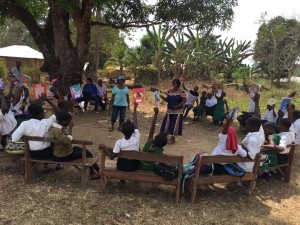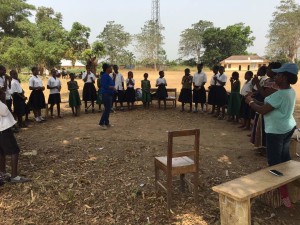Donor: CRS
Quarter Activities per Objective
- Intermediate Result 1: Foster families provide improved parenting to EVD affected children
Activity 1.1 Social Workers carried out parental skills training to all 58 caregivers of the “we yone pikin” project and community members who are part of the SILC groups in the respective communities. The 7th module (Never Forgetting the Past: Loss and Grief) was been rolled out to caregivers. This module helped caregivers to learn that it is normal for children to miss their deceased relatives, and the life they used to know with them. This does not mean that they are not grateful for the care and support you are providing.
- Sub-Intermediate Result1: Foster families spend more economic resources for caring
Activity 1.1.1 SILC groups continue to be growing and faring on well. Savings in the groups continues to increase week after week. Members of the savings groups continues to secure loans from the groups of which the loans are been used to attend to domestic concerns.
Activity 1.1.2 Social Workers along with Field Agents carried out process monitoring of SILC groups in their respective areas of responsibilities. The groups are visited whiles they meet for weekly contribution. During the visit Social Workers and Field Agent guide the groups to follow laid down roles and regulations that govern their groups.
Activity 1.1.3 The monitoring team along with the lead Social Worker also do conduct routine monitoring visit to communities were the SILC groups are formed.
- Sub-Intermediate Result2: Foster parents treat EVD affected children fairly and with love and respect.
Activity 1.2.1.a: Findings from end of project assessment conducted by CRS on “we Yone Pikin project phase one” indicates that caregivers did not understand parental skills training rolled out to them in phase one of the project. The reason for this was that the training was rolled out at once to foster parent thereby living the highly illiterate and slow learning caregivers with little understanding on Positive Parenting Skills. This short fall in phase one prompted the need for a review of training materials on parental skills. The training manual was later reviewed, simplified and reorganized into 8 cascading modules with one module to be rolled out every month to caregivers in their respective SILC groups’ when they come together for weekly contributions. This approach has increased the understanding of positive parenting and alternately taking good care of the children that stay with them. Caritas Bo staff (Social Workers) were trained for a day on the manual and on how to facilitate training on positive parental skills.
Activity 1.2.1.b: Having gone through one day training on Positive Parental Skills from CRS, Social Workers in return rolled out parental skills training to 58 caregivers during their respective SILC group weekly and or monthly meetings. One module is being rolled out to each SILC groups on a monthly basis. The reporting period saw the rolling out of 7 Modules (modules 1 to 7) to Caregivers through training on parental skills. The titles of the different modules rolled out so far include:
- Being a foster parent is to be a loving parent
- Children Change as They Grow Older
- Good Listening and Responding Skills,
- Boys, Girls and the importance of School
- Good Discipline and the Role Model
- What is Child Abuse and How to Respond?
- Never forgetting the past: loss and grief
The training is geared towards ensuring that Caregivers learn about Positive Parenting in a bid to improving their relationship with their children and how to see both boys and girls as one in terms of opportunities, how to recognize individual differences among children and so on.
Intermediate Result 2: EVD affected children are better able to cope with their situation.
- Sub-Intermediate Result 2.1: EVD affected children feel more confident and nurtured.
- Activity 2.1.1. Social Workers along Catholic Women Organization Members do roll out the “singing to the lions” therapy to all 119 children who are been divided into clusters in six chiefdoms in Bo district. With the rolling out this activity, children are better prepared to overcome fear and become resilience to their situation.
Intermediate Result 3: Community leadership is better able to protect children.
- Sub-Intermediate Result 3.1: Community-led protection mechanisms are functioning and provide monitoring and follow up.
Issues and Challenges
Break of motor bike still remains a challenge; this is having huge impact on project implementation in terms of achieving result. It is also having cost implication on the project budget line. However, we hope for a very brighter light at the end of next quarter after receiving two used motor bike from CRS through the dynamic effort Kat the CRS project manager attached to we yone pikin project.
Skeletal budget line is also having effect on the implementation of project activities. This is even worse after the increase in commodity prices in the market due to the decline in value of dollar.
Lack of refreshment for children during the rolling out of singing to the lion’s activities is also a challenge.
Lack of musical player for children for activities on singing to the lions is also another challenge.
Indicate resolutions or proposed corrective actions
- CRS to provide additional funds to provide refreshment for children during singing to the lions activities.
- Social Workers to improvise in providing their personal musical players during rolling out singing to the lions activities.
See photos below:

